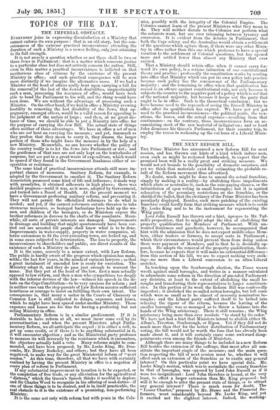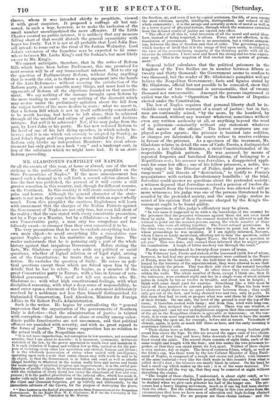THE NEXT REFORM BILL.
THE Prime Minister has announced a new Reform Bill for next session, and has thrown out hints of a kind which induce men, even such as might be reckoned hardheaded, to expect that the promised boon will be a really great and striking measure. We would not set bounds to the possibility of dramatic surprises, and yet we think that materials exist for estimating the probable re- sult of the Reform movement thus advertised.
No doubt, much might be done to amend the actual franchise, simply by making it a reality—by abolishing those impediments which abate or neutralize it, such as the rate-paying clauses, or the intimidation of open voting in small boroughs ; but it is against relaxation of the pecuniary restrictions on the franchise, or the shield of the ballot, that the obstinacy of the Prime Minister has been peculiarly displayed. Besides, such mere patching of the existing franchise could hardly form that striking measure which is to outdo Mr. Locke King and to be the instrument for regenerating the Whig party.
Lord John Russell has thrown out a hint, apropos to Mr. Tuf- nell's proposition, that he might adopt the idea of abolishing the property qualification for Members of Parliament. With un- wonted frankness and gaucherie, however, he accompanied that hint with the admission that he does not expect middle-class Mem- bers, either traders or farmers, to accept seats in Parliament ; which their circumstances would prevent them from doing unless there were payment of Members, and to that he is decidedly op- posed. He adopts the removal of the property qualification, there- fore, because he expects that it will make no substantial difference : from this section of his bill, we are to expect nothing very strik- ing—no more than a Liberal concession to an ultra-Liberal crotchet.
In touching upon the Scarborough election, the Times waxes wroth against small boroughs, and writes in a manner calculated to adumbrate some reform in the direction of amended Parliament- my districts, at least to the extent of abolishing the small bo- roughs and transferring their representatives to larger constituen- cies. In this portion of its work the Reform Bill was confessedly imperfect ; it abolished the so-called rotten boroughs, but left some which were so small as to be almost of necessity nomination bo- roughs; and the Liberal party suffered itself to be bribed into relaxins.a the rigour of the reform, because the leaving of the smaller boroughs was so managed as to throw a balance into the hands of the Whig aristocracy. There it still remains ; the Whig aristocracy being more than ever resolute "to stand by its order." We have not had a hint that Ministers intend to abolish either St. Alban's, Tiverton, Scarborough, or Ripon. Yet if they did not do much more than that for the better distribution of Parliamentary voting, the bill would not be worth the fuss that has already been made about it, and it will certainly cause some awkward disap- pointments even among the friends of Ministers.
Although there are many things to be included in a new Reform Bill besides the extension of the suffrage, that must after all con- stitute the important staple of the measure ; and the main ques- tion respecting the bill of next session must be, whether it will effect such an extension of the franchise as to excite any general interest? On this particular point we have special data. Mr. Locke King's motion, which was to assimilate the county franchise to that of boroughs, was opposed by Lord John Russell as if it were too insignificant : Lord John therefore is bound, at the very least, to effect a larger extension than Mr. King proposed : but will it be enough to alter the present state of things, or to attract any general interest ? There is much room for doubt. The "Lesser Charter," proposed by Mr. Hume and the Financial Re- f ormer s, went considerably beyond Mr. Locke King, and .yet it excited not the slightest interest Indeed, the working- elasses whom it was intended chiefly to propitiate, viewed it with great suspicion. It proposed a suffrage all but uni- versal, in such a way, however, as to make the exclusion of the small number unenfranchised the more offensive. If the Little Charter created no public interest, it is unlikely that any measure falling short of that would disturb the general equanimity with hopes too lively. Yet it is not at all probable that Lord John Rus- sell intends to come out as the rival of Sir Joshua Walmsley. Lord John's extension of the franchise may be expected to lie some- here between Mr. Locke King's and Sir Joshua's, but most likely se o'er to Mr. King's. We cannot anticipate, therefore, that in the series of Reform Bills which have been before Parliament, this one promised for next session will be of any transcendent interest. But to stir up the question of Parliamentary Reform, without doing anything that is worth the stir, is to throw a great argument into the hands of the Anti-Reformers: without securing the satisfaction of the Reform party, it must unsettle many things, and must lend to the opponents of Reform all the objections founded on that unsettle- ment. We say nothing of the damage brought upon Reform by the mere trading in cant; we say nothing of the discredit which may ass rue under the preliminary agitation about the bill from the vulgar tactics of the mere dealers in seats : what we assert is, that a Reform Bill which is not in itself sufficiently considerable to be worth having, had better be left alone, than be achieved through all the mischief and odium of party conflict and factious intrigue. But will it be achieved ? Not, if we may judge from the past, by Lord John or his party. He has now reduced Reform to the level of one of his last dying speeches, in which nobody be- lieves; and it is one which can scarcely be adopted by Stanley, as Lord John's Sugar and Corn promises were fen lied by Peel. His Reform only blocks up independent Members: his rival adver- tisement has only given us a hack " cry " and a bankrupt cant, in lieu of the substance which we might have had. It is an Anti- Reform proceeding.



























 Previous page
Previous page